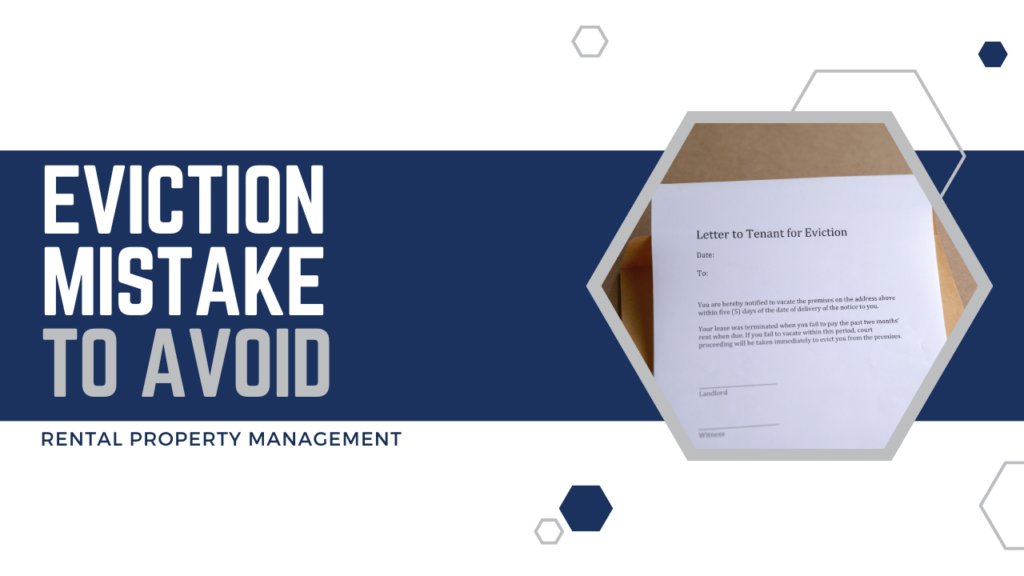
If you’re like most rental property owners in Roanoke, you don’t love talking about evictions.
Evictions are expensive. They’re frustrating. They’re unpleasant.
They’re even worse when you make a mistake.
Eviction mistakes will not lead to anything good for you. When you make even a tiny error, the judge is likely to toss out your whole case. Miss one deadline or forget one filing, and you’ll find yourself back to where you started. Meanwhile, your tenant has continued to live in your property without paying rent or correcting their lease violation.
Virginia has a standard set of processes and timelines that must be adhered to when you’re evicting a tenant. All you have to do is follow them, and you’ll effectively remove the tenant who is not paying rent or who is being a nuisance to the community.
But, mistakes can easily be made, especially if you’ve never evicted anyone before.
We’re going to highlight some common eviction mistakes, and we’re going to show you how to avoid them.
Here’s what you need to know first:
Don’t Evict a Tenant Alone
You don’t have to struggle through the confusing and often complex process of evicting a tenant.
Work with a professional property manager in Roanoke. Or, talk to an experienced landlord/tenant attorney. We can make you a referral if you’re not sure where to turn.
This is an area where we’re great at what we do. Our eviction rate is low, but when we do have to take the necessary steps towards eviction, we know exactly what to do. Work with us, and you’ll have fewer evictions to worry about.
Here are those mistakes you don’t want to encounter during an eviction.
FOCUS ON THE LEGAL PROCESS
ILLEGAL EVICTIONS ARE A HUGE MISTAKE

This is definitely NOT the eviction mistake you want to make.
First things first – do you even have the legal standing to evict?
According to landlord and tenant laws in Virginia, a landlord may evict a tenant only for the following reasons:
- Nonpayment of rent
- Code violations. If the tenant treats the property in such a way that applicable building and housing codes are violated, eviction is on the table.
- Violation of a federal, state, or local law or illegal activity happening inside the home.
- Violation of any rule or provisions of the rental agreement that can threaten life or safety. For lesser lease violations, you can evict if two or more violations of any rule or provision of the rental agreement occur within a six-month period.
Here are some of the drastic – and illegal – actions we have heard of landlords taking in order to get a tenant out of their property.
| Changing the Locks | Please do not change the locks at your property just because you want your tenants out. You can’t lock your tenants out of the property when they have not been formally and lawfully evicted from that property. It’s still their home, until the courts say otherwise. |
| Turning off the Utilities | It’s also important that you don’t contact the utility company to have the electricity or the water shut off. You might want to force them out by making things uncomfortable at your property, but this will only invite legal trouble. |
| Confronting and Threatening the Tenants | You don’t want to be that landlord who shows up screaming and hurling threats. It makes you look bad and it can also make the courts more sympathetic to the tenants. Follow the law. |
If you don’t trust yourself to manage the eviction process without spiraling into unethical and illegal practices, seek help from an attorney or a Roanoke property manager right away. You likely need the buffer that a professional can provide.
TIME IS OF THE ESSENCE
DON’T WAIT TOO LONG TO BEGIN THE EVICTION PROCESS
 Are you a kind person who feels for anyone with a sad story?
Are you a kind person who feels for anyone with a sad story?
Great. But, when it comes to protecting your investment and your rental income, you don’t want to be too willing to listen to every sob story that every tenant tells you.
Avoid Eviction if You Can
We’re not suggesting everyone should be rushing into eviction as soon as rent is a few hours late. But, it’s always a good idea to avoid the eviction process when you can. It takes time, it costs money, and it’s unpleasant for owners and tenants alike.
If your tenant seems to really want to work something out, you should go ahead and negotiate what you can, especially if it’s a good tenant. Try to set up a payment arrangement or a payment plan. Find out whether this is a one-time issue that happened to come up this month or if paying the rent on time is going to be a problem going forward.
You can be accommodating and flexible without being too vulnerable.
Mitigate Your Loss of Rent
When you do decide that eviction is the only way, however, move quickly to get the case heard. If you wait too long to file for the eviction, you might find yourself going several months without rental income. That’s going to hurt. You’d rather get those tenants out of there so you can move in new residents who are willing and able to pay the rent on time.
Serve Your Notice
For nonpayment of rent, you’ll serve a Five Day Notice to Pay or Quit. For lease violations, your notice period will be longer.
What does your lease agreement say? You should serve the notice as soon as any grace periods end. Don’t wait until the end of the month to begin the eviction process. By then, it’s almost a new month and you have to wonder how the tenants will pay rent for two months at one time.
Don’t wait too long. It’s a mistake. Instead, create and enforce a rent collection process and know when it’s time to start the eviction process. Otherwise, you’re wasting time and losing money.
Here’s something to remember: the eviction process must be called off if and when the tenants do come up with all the rent and fees that are owed. So, starting the process doesn’t mean you have to see it through. The tenants can still pay rent and you can still call off the eviction.
Protect yourself and get it started.
DON’T IGNORE THE NOTICE PERIOD
 It’s a huge mistake not to provide the legally required notice to your tenants before you evict them, and we see this mistake a lot. Some owners simply do not realize a notice must be served. Instead, they immediately go to court thinking they’ll have their tenants thrown out.
It’s a huge mistake not to provide the legally required notice to your tenants before you evict them, and we see this mistake a lot. Some owners simply do not realize a notice must be served. Instead, they immediately go to court thinking they’ll have their tenants thrown out.
Before you can even file for eviction, you have to provide and serve a notice to the tenants, letting them know that the eviction is coming. You can’t even file for an eviction without that notice, because you have to attach it with your filing.
The notice period you’re required to provide will depend on the reason for your eviction.
Let’s take a look at this chart, which tells you how much notice is required for each type of eviction.

| Failure to Pay Rent
If tenants are late paying rent, serve a five-day notice to pay rent or quit. This notice will inform the tenants that they have five days to either pay rent or move out of the rental unit. If the tenants don’t pay rent within the five days, you can file an eviction lawsuit. (Va. Code Ann. § 55.1-1245F (2020).) |
Five Day Pay or Quit Notice |
| Lease Violation that Can be Remedied
If the tenant violates the lease agreement but they can fix the problem, serve a 30-day notice to cure or quit. This notice will inform the tenant that the tenant has 30 days to either remedy the violation or move out of the rental unit. If the tenant does not do either of those things, you can file an eviction lawsuit at the end of the 30 days. (Va. Code Ann. § 55.1-1245A (2020).) |
30 Day Notice to Cure or Quit |
| Lease Violations that Cannot be Remedied
If the tenant violates the lease or rental agreement in such a way that there’s no remedy, provide a 30-day unconditional quit notice. The notice must specify the breach of the lease and instruct the tenant to move out at the end of the 30-day period. If they do not vacate, file an eviction lawsuit. (Va. Code Ann. § 55.1-1245C (2020).) |
30 Day Unconditional Quit Notice |
| Criminal Behavior in the Property
The landlord is not required to give the tenant any kind of notice if the tenant commits a criminal or willful act that is not remediable and poses a threat to health or safety. This includes any illegal drug activity. The landlord can go straight to court and file an eviction lawsuit against the tenant. (Va. Code Ann. § 55.1-1245C(2020).) |
No Notice Necessary |
MISTAKES WITH DOCUMENTATION
OR MISSING DOCUMENTATION

Once you’re in court, make sure you’re prepared. Depending on the type of eviction you’re pursuing, you will likely need:
- The signed lease agreement. This will be needed for every possible eviction reason.
- Accounting documents. If you’re evicting because rent is not paid or because your tenant has a history of not paying rent when it’s due, you’ll want to show the financial records that back this up. Bring your ledger, your rent roll, or your printout that documents the problem.
- Documented evidence of lease violations.
- Court records that document convictions for assault, drugs, or threats.
- Correspondence between you and your tenants, including the served notice.
Don’t show up for court expecting everything will go your way just because you’re the property owner who wants the home back. You’ll need all your proof, and this is another reason why a professional attorney or property manager can be so beneficial. We’re very organized and thorough when it comes to documentation.
MISSING YOUR COURT DATE
 Imagine finally getting to the day your eviction is scheduled to be heard in court, and then you don’t show up.
Imagine finally getting to the day your eviction is scheduled to be heard in court, and then you don’t show up.
Huge mistake.
Make sure you’re there.
If there isn’t anything resolved during the mediation that will take place during the initial conference, there may be another court date scheduled.
Make sure you’re there, too.
If you don’t show up, you don’t get your eviction.
MISTAKES IN GAINING POSSESSION
 Let’s assume you’ll win your eviction case and get a judgment for possession.
Let’s assume you’ll win your eviction case and get a judgment for possession.
That’s great news, but it doesn’t mean you’ll get your property back that day. It simply means you have the right to evict the tenant. Don’t follow them home. Don’t demand they leave.
Instead, get a Writ of Possession. Here’s how it works:
- The tenant has a 10-day period in which they can appeal.
- Then, you can file a Request for Writ of Possession in Unlawful Detainer Proceedings. This is filed with the clerk of the General District Court. You have 180 days from the date of the judgment to request this.
- The court sends the Writ of Possession to the Sheriff’s Office.
- The Sheriff’s Office has 30 days from the court’s signing to execute the document. You can expect the Sheriff’s Office to contact you with the scheduled date and time of the eviction.
This is basically in the Sheriff’s hands. Don’t try to rush anything.
The sheriff must give the tenant at least 72 hours to move out of the property. Usually, they provide more notice, even up to a week.
FORGETTING THE EXTENDED RIGHT OF REDEMPTION

In 2019, the Virginia General Assembly passed a law called the Extended Right of Redemption. If you’re not familiar with this law, you need to understand how it pertains to eviction cases.
According to this ruling, your tenant can now pay everything owed up to two business days before the scheduled eviction date. The tenant can use a redemption, redemption tender, or extended redemption only once in any 12-month period.
You might think you’ve won your eviction case and you might feel justified in getting ready to turn that property over to a new tenant, but it would be a mistake. You still have to wait and make sure your evicted tenant doesn’t come up with the money required to stay in the property.
CHOOSING A FULL EVICTION OVER A 24-HOUR LOCK CHANGE EVICTION
 You have two options when it comes to how the Sheriff will physically remove your tenants and their personal possessions.
You have two options when it comes to how the Sheriff will physically remove your tenants and their personal possessions.
You can select whichever one you like, but if you’re interested in not spending any more money than you have to, it would be a mistake to go with a full eviction. Here’s the difference.
Full EvictionThe Sheriff will place any of the tenant’s property that is in the home on the street, at the nearest public right of way. You’ll need to be there with your locksmith. The Sheriff is not there to be on your side, and it would be a mistake to think that. The role of the Sheriff is to protect the interests of both parties. It’s the Sheriff’s right to ask you to provide a moving truck, materials such as boxes to move out personal property, and any other special equipment. If the weather is bad, they can even postpone the eviction to another day.
24-Hour Lock Change EvictionThis type of eviction will save you money. Possession of the dwelling is granted to the landlord within 24 hours after the scheduled eviction date and time. On eviction day, you are asked to show up at the property with a locksmith to change all of the locks on exterior entrances to the dwelling. Then, the property essentially stores the tenant’s property for the next 24 hours. You have to grant access to your tenants during that 24-hour period if they want to retrieve their belongings. The tenant cannot stay in the dwelling overnight. At the end of the 24-hour period, any property left in the dwelling goes into the possession of the landlord who must sell or destroy it. |
Eviction mistakes are easy to make, and they’re difficult to rectify. Always consult with your Roanoke property management company. If you don’t have a Roanoke property manager, leverage our experience and resources. We can walk you through the process. We can help you avoid these mistakes.
Evictions are emotional. However, if you stay professional and respectful during the process, you’ll find that the whole process runs smoother. It’s effective.
Don’t do the eviction on your own. Working with experts is always going to lead to better outcomes.
If you want to avoid evictions altogether, be extra careful during your screening process. Develop great relationships with your tenants. And of course, work with a property management company.
Please contact us at Lawson Realty Group whether you’re a new investor or an experienced real estate owner. We manage properties in Southwest Virginia throughout the Roanoke Valley, including Salem, Cave Spring, Hollins, Vinton, Glenvar, and Southwest Roanoke County.
